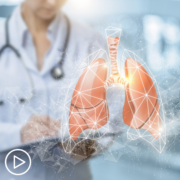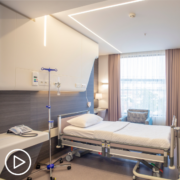What Testing Should Take Place After Non-Small Cell Lung Cancer Treatment?
What Testing Should Take Place After Non-Small Cell Lung Cancer Treatment? from Patient Empowerment Network on Vimeo.
It’s well-known that patients should undergo testing before choosing lung cancer therapy, but what testing should take place following treatment? Lung cancer specialist Dr. Tejas Patil, from the University of Colorado Cancer Center, discusses the role of testing after treatment.
Dr. Tejas Patil is an academic thoracic oncologist at the University of Colorado Cancer Center focused on targeted therapies and novel biomarkers in lung cancer. Learn more about Dr. Patil, here.
See More From INSIST! Lung Cancer
Related Resources:
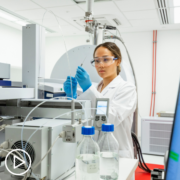
|
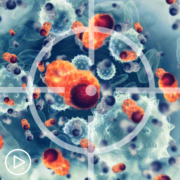
|
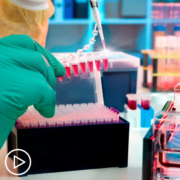
|
Transcript:
Katherine:
We know that patients should undergo testing before choosing therapy, but what testing should take place following treatment?
Dr. Patil:
That’s a really good question. And it’s a complex question depending on the type of treatment that the patient is receiving. So, broadly speaking in lung cancer, we’ve separated the field into two types of treatments.
Patients with lung cancers will get molecular testing at the onset, right? When they’re diagnosed to look for what’s called a driver oncogene. So, these are mutations that can be targeted with pill-based treatments. And if patients have these mutations, there’s about 10 of these right now and several in development, then the patients can receive a targeted therapy.
However, if they don’t have these mutations, then the standard of care right now is some kind of chemotherapy with immunotherapy. Now, the question asked was what kind of testing do you do after diagnosis? And that really depends on which camp you’re in. So, if you’re in the targeted therapy camp, my general practice has been to repeat molecular testing upon progression. The reason is that patients who are receiving targeted therapies typically evolved some kind of resistance to targeted therapy.
Broadly speaking, you can categorize these as on target or off target resistance, but the major reason for doing repeat molecular testing is to understand a mechanism of resistance and then hopefully develop a new treatment with that knowledge. Now for the camp that doesn’t receive targeted therapies, let’s say they receive chemotherapy and immunotherapy, there it gets a little bit more nuanced.
And if there is a role for repeating a biopsy and looking for dynamic changes in the patient’s cancer, but it is not routine and should be done with consultation with a thoracic oncologist. And really the idea here is that if patients who are on chemo immunotherapy progress, any additional molecular testing should really help inform what the next line of treatment will be and sometimes that can be a clinical trial.

